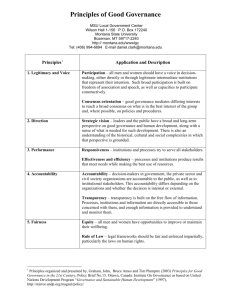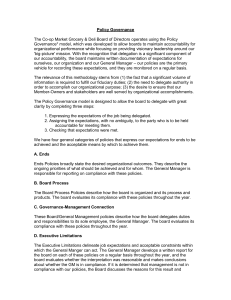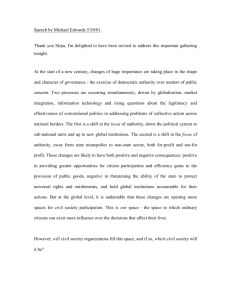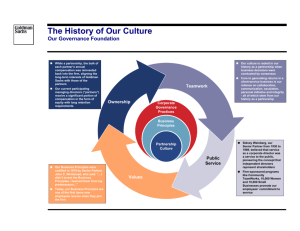Glossary of Governance Terms
advertisement
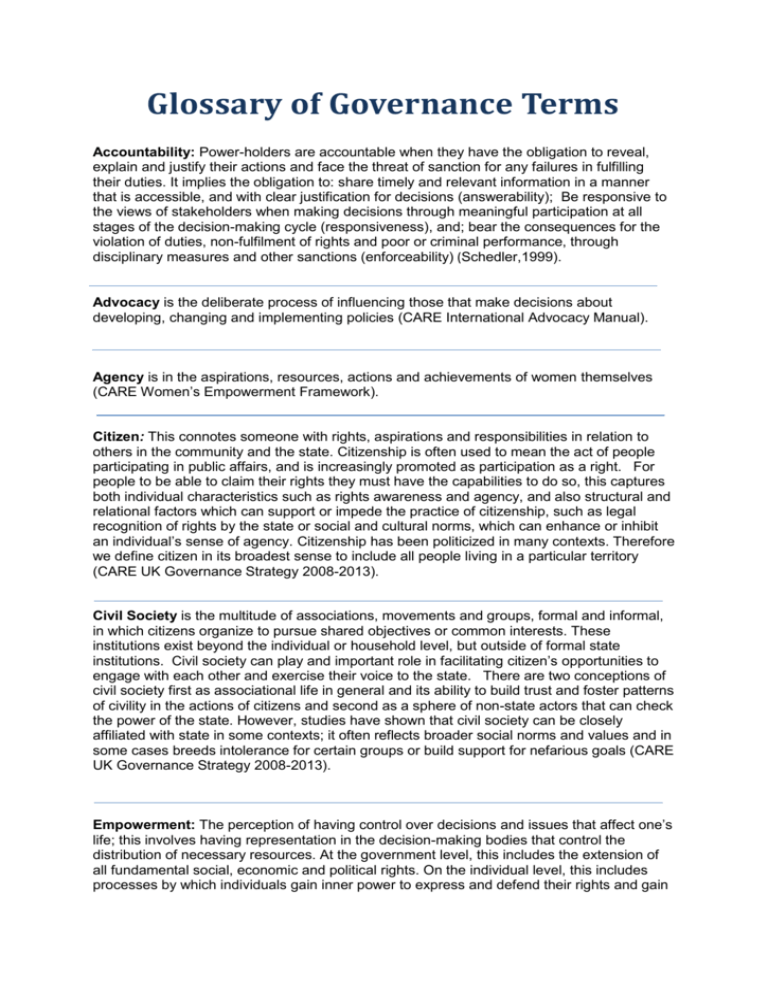
Glossary of Governance Terms Accountability: Power-holders are accountable when they have the obligation to reveal, explain and justify their actions and face the threat of sanction for any failures in fulfilling their duties. It implies the obligation to: share timely and relevant information in a manner that is accessible, and with clear justification for decisions (answerability); Be responsive to the views of stakeholders when making decisions through meaningful participation at all stages of the decision-making cycle (responsiveness), and; bear the consequences for the violation of duties, non-fulfilment of rights and poor or criminal performance, through disciplinary measures and other sanctions (enforceability) (Schedler,1999). Advocacy is the deliberate process of influencing those that make decisions about developing, changing and implementing policies (CARE International Advocacy Manual). Agency is in the aspirations, resources, actions and achievements of women themselves (CARE Women’s Empowerment Framework). Citizen: This connotes someone with rights, aspirations and responsibilities in relation to others in the community and the state. Citizenship is often used to mean the act of people participating in public affairs, and is increasingly promoted as participation as a right. For people to be able to claim their rights they must have the capabilities to do so, this captures both individual characteristics such as rights awareness and agency, and also structural and relational factors which can support or impede the practice of citizenship, such as legal recognition of rights by the state or social and cultural norms, which can enhance or inhibit an individual’s sense of agency. Citizenship has been politicized in many contexts. Therefore we define citizen in its broadest sense to include all people living in a particular territory (CARE UK Governance Strategy 2008-2013). Civil Society is the multitude of associations, movements and groups, formal and informal, in which citizens organize to pursue shared objectives or common interests. These institutions exist beyond the individual or household level, but outside of formal state institutions. Civil society can play and important role in facilitating citizen’s opportunities to engage with each other and exercise their voice to the state. There are two conceptions of civil society first as associational life in general and its ability to build trust and foster patterns of civility in the actions of citizens and second as a sphere of non-state actors that can check the power of the state. However, studies have shown that civil society can be closely affiliated with state in some contexts; it often reflects broader social norms and values and in some cases breeds intolerance for certain groups or build support for nefarious goals (CARE UK Governance Strategy 2008-2013). Empowerment: The perception of having control over decisions and issues that affect one’s life; this involves having representation in the decision-making bodies that control the distribution of necessary resources. At the government level, this includes the extension of all fundamental social, economic and political rights. On the individual level, this includes processes by which individuals gain inner power to express and defend their rights and gain self-esteem and control over their own lives and personal and social relationships (CARE International). Forward Accountability: By this we mean an NGO’s accountability towards its primary stakeholders, i.e. the people whose lives it seeks to improve and in whose name it raises its funds. Also known as beneficiary or downward accountability, the terminology used reflects an intention to set it apart from so-called upward accountability, referring to an organisation’s obligations towards its donors and sponsors. It is meant to capture the wide spectrum of practices, tools and mechanisms that enable project participants (or intended ‘beneficiaries’) to genuinely understand and influence the work and programmes from which they ought to benefit. Access to information as well as responsive, safe and reliable feedback mechanisms; participation in decision-making; and an organisational environment that reflects these principles are essential components of Forward Accountability (CARE Governance Wiki). Fragile State: This is a state 'unable to meet [their] population’s expectations or manage changes in expectations and capacity through the political process' (OECD, 2008).’ Gender is not the biological differences between men and women, boys and girls. Gender is a social construct that defines what it means to be a man or woman, boy or girl in a given society – it carries specific roles, status and expectations within households, communities and culture. Individuals may also self-identify as neither male or female, or both male and female (Explanatory Note on CARE's Gender Focus, 2012). Gender accountability refers to how institutions and mechanisms are accountable in different ways to women and men (GPF, 2011). Gender equity is the process of being fair to women and men. To ensure fairness, strategies and measures must often be available to compensate for women’s historical and social disadvantages that prevent women and men from otherwise operating on a level playing field. Equity leads to equality (Explanatory Note on CARE's Gender Focus, 2012). Gender equality - or equality between women and men - refers to the equal enjoyment by women, girls, boys and men of rights, opportunities, resources and rewards. A critical aspect of promoting gender equality is the empowerment of women, with a focus on identifying and redressing power imbalances. Equality does not mean that women and men are the same but that their enjoyment of rights, opportunities and life changes are not governed or limited by whether they were born female or male (Explanatory Note on CARE's Gender Focus, 2012). Gender transformative programming entails shifting harmful gender norms by redressing power disparities between men, and women to promote a more equitable environment for both sexes. The transformative approach encourages examining, questioning and changing rigid gender norms and power imbalances as a means of reaching health as well as gender equity objectives (CARE International). Governance is the exercise of power in the management of public affairs. It is a dynamic, political process through which decisions are made, conflicts are resolved and diverse interests are negotiated. The process can be influenced by formal written codes, informal but broadly accepted cultural norms, the charismatic leadership of an individual or individuals, the use of force, coercion or patronage, or, often, a combination of these means (CARE International UK, 2011). Good governance is the effective, participatory, transparent, equitable and accountable management of public affairs guided by agreed procedures and principles, to achieve the goals of sustainable poverty reduction and social justice (CARE International UK, 2011). Institutions are the ‘societal “rules of the game” that shape and constrain human interaction and individual choices. Institutions can be a formal set of rules such as a constitution, a political regime, executive judicial relations or elections. Institutions can also be informal rules — the norms, cultural practices or habitual ways of doing things that frame social behaviour and interaction and that encompass social hierarchies, patron client relations, and various forms of rent-seeking. Institutions provide the context that affects the behaviour of stakeholders involved in the policy decision-making process, implementation and impact/outcome. It is also crucial to understand who can influence or change institutions, both de jure and de facto (World Bank, 2008: 11).’ Legitimacy: Legitimacy is about recognition of the right to govern or influence both by the government and by the citizens. An institution or government is legitimate if it is generally approved by the people who are subject to its authority. The degree of legitimacy is often strongly related to the existence of democratic processes, such as free and fair elections. A government institution that is recognized to be in place as a result of a collective decision of citizens is more likely to be legitimate. Another factor influencing legitimacy is the ability of the government to fulfill its tasks and responsibilities, and specifically the promises that were made during the election campaign (CARE Nederland, 2010). Citizen Participation is the redistribution of power that enables the have-not citizens, presently excluded from the political and economic processes, to be deliberately included in the future (Arnstein, 1969). The ladder of participation (in annex) demonstrates a hierarchy of different forms of citizen participation. The higher you go on the ladder—in the direction of citizen control—the greater the likelihood that both citizen engagement and democratic processes will occur. The zenith is “citizen control”, whereby citizens are active citizens, defining and controlling the development that they themselves wish to see. Political economy analysis (PEA) ‘is concerned with the interaction of political and economic processes in a society: the distribution of power and wealth between different groups and individuals, and the processes that create, sustain and transform these relationships over time (OECD-DAC in DFID 2009: 4).’ Power can be: • Power over: the power of the strong over the weak, including the power to exclude others. • Power to: the capability to decide actions and carry them out. • Power with: collective power, through organisation, solidarity and joint action. • Power within: personal self-confidence often linked to culture, religion or other aspects of identity, which influences the thoughts and actions that appear legitimate or acceptable (Oxfam, 2011). Private Sector: The private sector is that part of an economy in which goods and services are produced by individuals and companies as opposed to the state, which controls the public sector. The private sector is important in governance because it can act as a convener of state and citizens, it can influence the actions of state and its own actions can impact upon citizens, it can act on behalf of state in the provision of services (CARE UK Governance Strategy 2008-2013). Relations are the array and quality of social interaction through which women enact agency and alter structure to realize rights & livelihood security (CARE Women’s Empowerment Framework). Responsiveness: Be responsive to the views of stakeholders in decision making. This implies meaningful participation (stakeholder engagement) at all stages of the decision making cycle - in planning, implementing and judging policies and programmes for their impact (on the lives of people and the planet). It requires that participation inputs of stakeholders translate into policies and practices (CARE UK Governance Strategy 20082013). Social accountability can be defined as an approach towards building accountability that relies on civic engagement, i.e., in which it is ordinary citizens and/or civil society organizations who participate directly or indirectly in exacting accountability (World Bank, 2004). Spaces are “arenas for public participation and engagement.” These spaces can be categorised as invited/formal spaces (provided by the government/state) and popular/informal spaces (where CSOs come together at their own initiative to channel unrecognised demands, protest, provide services and solidarity, etc.). Examples of formal spaces include local development committees, participatory budget committees, mixed state and civil society roundtables to fight poverty, etc. Examples of informal spaces include campaigns, demonstrations, civil society groups, blogs and other social media fora, etc. The boundaries between these spaces are flexible, not always clear cut and may change over time (Adapted from Cornwall, 2004). Social mobilisation is the process through which local (and sometimes global) actors collectively engage to claim and create spaces for participation. These are popular/informal spaces where civil society actors come together of their own initiative to channel unrecognised demands, protest, provide services and solidarity, etc. The primary objectives of ‘social mobilisers’ are typically to help strengthen local voice; increase the extent to which local groups and communities can participate actively in decision-making processes; ensure that citizens and communities are able to hold local government and service providers to account. Efforts to promote social mobilisation should necessarily seek to address structural causes of inequalities and exclusion (CARE Governance Wiki). State: The state plays a central role in the development process. A state has obligations to its citizens, whose rights are enshrined in the constitution and legal codes. As the legal sovereign, the state is the only guarantor of universal access to public good. The state often underperforms or fails to exercise its responsibilities. The replacement of state provision of services by non-state actors is only a temporary solution to the underlying issue of institutional weakness. The notion of state goes beyond government, it includes “the continuous administrative, legal, bureaucratic and coercive systems that attempt not only to structure the relations between civil society and public authorities in a particular system of government but also to structure many crucial relationships within civil society as well (Adapted from Alfred Stepan, CARE UK Governance Strategy 2008-2013).” State capability: Public authorities are responsible for ensuring citizens' political, social and economic rights, and in order to achieve outcomes that ensure social justice it is imperative that public authorities and other power-holders have the capacity to uphold these rights and deliver public goods. State capability means that state agencies and public authorities have both the capacity (technical and administrative) and ability (political and institutional) to deliver public goods. In general, capable states are able to formulate policies effectively (reconciling political and technical trade-offs between polities and technocrats) and to implement policies effectively (in terms of coordination, organisation, administration and accountability). To strengthen state capability means to respond to address these issues throughout the policy cycle, from design to delivery (CARE Governance Wiki). Structures are the routines, conventions, relationships and taken-for-granted behaviour. These include the social institutions that establish agreed-upon significations (meanings), accepted forms of domination (who has power over what or whom), and agreed criteria for legitimizing the social order (CARE Women’s Empowerment Framework). Transparency: Transparency is based on a situation of availability and free circulation of information around the actions and decisions of government institutions, including the content of laws, budgets and expenses, (annual) planning and prioritization. This assumes that the actions and decision, including the processes used to implement or take them, are to a certain extent open to be reviewed by the administration, the parliament, the civil society and in some cases external institutions and authorities (Amadou, 2005 in CARE Burundi, 2011). Annex Figure 1. Governance Programming Framework Domains of Change Sustainable Development with Equity Expanded, Inclusive & Effective Spaces for Negotiation Accountable & Effective Public Authorities and other Power-Holders Empowered Citizens Figure 2. CARE Women’s Empowerment Domains Agency Carrying out our own analyses, making our own decisions, and taking our own actions Empowerment involves poor women becoming the agents of their own development Structure Relations Routines, conventions, relationships and takenfor-granted behaviour Array and quality of social interaction through which women enact agency & alter structure to realize rights & livelihood security Empowerment involves women analysing, then renegotiating or establishing supportive and strategic relations. Institutions that establish agreed-upon significations (meanings), accepted forms of domination (who has power over what or whom), and agreed criteria for legitimizing the social order Figure 3. Empowerment Process Individuals change: Poor women become actors for change, able to analyse their own lives, make their own decisions and take their own actions. Women (and men) gain ability to act by building awareness, skills, knowledge, confidence and experience. and and Structures change: Women and men, individually and collectively, challenge the routines, conventions, laws, family forms, kinship structures and taken-for-granted behaviours that shape their lives – the accepted forms of power and how these are perpetuated. Relations change: Women and men form new relations with other social actors, form coalitions and develop mutual support in order to negotiate, be agents of change, alter structures and so realize rights, dignity and livelihood security. Figure 4. Ladder of Participation and
